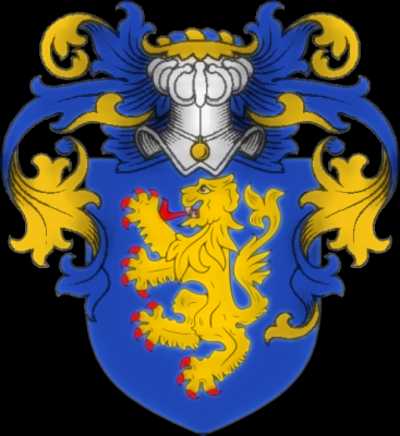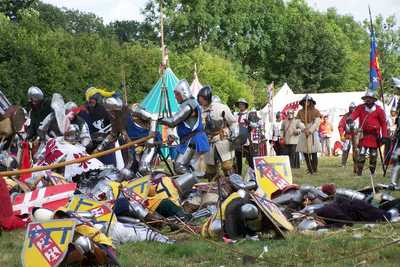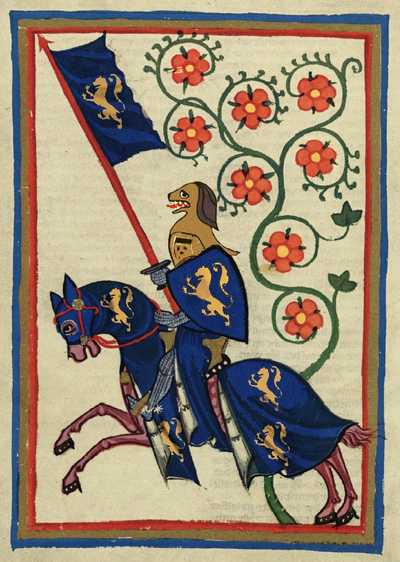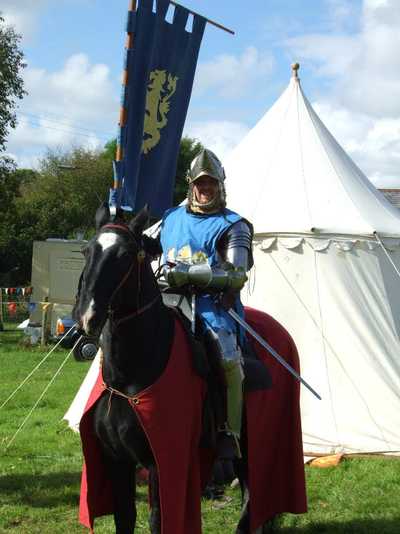|
Lord Gerard de Rodes
|
(Last updated: 2011-06-21 14:38:00 ET)
|
[Freemen of Gwent]
 |

| | De Rodes Coat of Arms. Azure, a lion rampant or. |
|  |
IntroductionI was never really interested in history at school but as a young boy, with an over active imagination, I was obsessed with castles and knights. I never could have believed that I would one day be playing at being an actual knight, in actual castles with other like minded "grown up kids". Medieval re-enactment became my passion many years ago now. Whilst researching for a possible medieval themed wedding for myself and Jo, I happened upon a re-enactment group's forum and began chatting to some of their members. That really was all it took to spark an interest to learn and experience more. I managed to persuade Jo, my son Dan and youngest daughter Caralee that this could be the best thing that would happen to us; little did we know just how much it would take over our lives. Much to Jo`s distaste, we still haven't had our themed wedding.
We were privileged to have been nurtured by some of the best in the business, which gave us a great standing within the hobby. I soon found myself having to play the evil English overlord type rolls and so the quest to find a decent persona began. I didn't really choose the character of Gerard De Rodes, more to the fact is that he chose me. I have always had a general interest in the history of my family name "Rhodes" so when a friend, within re-enactment, found a tantalising snippet about the de Rodes family, I jumped straight onto the case. After a few years of armchair research I had built quite a library of information about the family throughout the medieval period. All credit has to be given to the proper historians throughout the ages whose works I have pillaged to present the following general history. I hope you find it informative if nothing else.
|
 |

| | Lord and Lady De Rodes and Caralee |
|  |
Factual De Rodes FamilyThe "de Rodes" family is first recorded in England when they came over with the Earl of Flanders and Tofti, Harolds brother, to assist William the Conqueror in his campaign of 1066. Already hereditary knights of Flanders, they were assured great rewards in England for their part in William the bastards claim on the kingdom. Willemus and Hugh were granted, doubtless as a reward for their services, the Moiety of Rodes, This estate was founded where the little village of Rode is now situated, in the County of Chester. Willemus had a son, Michael, who was known as Michael de Rodes, and his descendants may be traced through the Domesday book, tax rolls, civil and court records, to the present time. Hugh returned to France and established the family of the Counts de Rodez. The French family sent its descendant, Baron Gerard de Rodes, back to England and through him an English branch was established.
Being of great antiquity; the family of Rodes flourished for several centuries in the Counties of Nottingham, Lincoln, York and Derby. The first settler on record in England, of this family, Gerard de Rodes, was a feudal baron, the capital seat of whose barony was Horn Castle in Lincolnshire. Horn Castle was a soke or seignory of thirteen lordships and Gerard De Rodes was consequently one of the greater barons, his absence as ambassador will account for his name not occurring on the Roll of Magna Charta, he having been sent by King John, 29th March, in the 9th year of his reign, ambassador to foreign parts. Baron Gerard de Rodes received from Richard I the lordships of Langar and Barneston, in Nottinghamshire. They were confirmed in him by King John. Baron Gerard also owned the estates of "Clifton and Wilford," of Nottinghamshire, previously owned by William Peverill. They came to him during the reign of King John. They passed to Ralph de Rodes, his son, "a very great man," who owned them during the the reign of Henry III. Clifton and Wilford passed to Gerard, Lord of Melles, at the end of Henry's reign or at the beginning Edward I's, and he granted them to Sir Gervase de Clifton, Steward to Sir Ralph de Rodes. Langar was granted to Sir Gerards other son, John de Rodes
Brothers in Trouble at Rufford abbey
An apparent outrage was participated in by two of the monks of this house in 1317, as to which we have only the statement of complaint. On 10 December 1317 a commission was appointed to inquire into the charge made against Andrew le Botiller, Richard de Balderton, John de Rodes, Thomas de Rodes, together with Brother William Sausemer and Brother Thomas de Nonyngton, monks of the house of Rufford, of gathering to them a multitude of men and seizing Thomas de Holme, as he was passing between the abbey of Rufford and the grange of Roewood (Rohagh), robbing him of his goods, and taking him to some unknown place and there detaining him until he should satisfy them with a ransom of £200 pounds
A measure of the character of the De Rodes family some might say!
Bannockburn
In the 14th century the De Rodes` had prospered by always being at the beck and call of the Kings and princes of England. In 1314 Sir John de Rodes had come back from Flanders to serve in King Edwards army against Robert the Bruce at Bannockburn and died in the service of his legitimate monarch.
Crecy
A Sir John Rodes, knight, was appointed master of the household to Edward the Black Prince of Wales. Sir John was at Crecy in 1346 and Poictiers in 1356. He lived in Aquitaine, returning to England shortly before his death, in 1381, in the service of King Richard II.
"He was a splendid example of the virtues and vices fostered by the spirit of chivalry"
Todate, no record has been found of the Rodes` at any other major campaigns during the Hundred Year War, but it can be assumed that, because of their status, they would have been present and taken part at some level. A few generations later, the Rodes estates seem to have been disposed or divided of in Nottinghamshire, and others retained in Yorkshire and Derbyshire where a branch of the family moved. This was founded by William Rodes who married Emme, daughter and heiress of John Cachehors of Staveley Woodthorp in Derbyshire. This remained the family seat until Barlborough Hall was built By Francis Rodes Esq, justice, in about 1583. Sir Francis took part in the trial of Mary, "Queen of Scotts" His son, Sir John Rodes, knight, sold Staveley and made Barlborough Hall the family residence.
|
|
The Fictional Lord Gerard De Rodes Lord Gerard de Rodes, born 1369. The first born son of a feudal baron and Ambassador in Flanders for the English King, also named Gerard, had inherited his father's estates at the age of 13, when his father (Gerard senior) died at the battle of Roosbeke assisting Flemish rebels against the French King Charles VI. Upon his return to England, to secure his estates, Gerard the younger was to find that things were not as simple and peaceful as he was lead to believe.
Many years previous, the country had been devastated by the black death. This had left a serious shortage of man power and had lead to a peasants revolt in 1381. Much of the de Rodes lands had been left to ruin during their absence.
The seemingly endless war with the French was raging hard and furious, claiming many a good man. The French had supported the Scots in an attack on English territories in Scotland and Northern England, further devastation had been caused. The French were, by now, a very real and constant threat at all of the borders of England. Young Gerard made the best of it by actively supporting the English Kings and, whilst he was in the Kings favour, took full advantage of it by recruiting as many people as he could to his retinue (sometimes overlooking the questionable character of some of these men).
"Behind every great man there is an even greater woman". Sir Gerard, conveniently, married the Lady Joanna, youngest daughter of the Earl of Ross who had received a charter for lands in Perthshire. Lady Joanna bore Sir Gerard a son and heir, Ralph de Rodes, and a daughter, the troublesome Cara. Joanna forcefully supported Sir Gerard in all of his actions for better or worse.
Between campaigns in France and his obligations in Flanders, Sir Gerard found his duties taking him to Wales. There was a relative, if not a very weak, peace between the English and the Welsh, but there always seemed to be enough trouble for Sir Gerard and his retinue to find themselves stuck in the thick of it. Unbeknown to the King, with the assistance of his friend and cohort, Sir David de Jarpanville, and the aid of his right hand henchman, Geoffery "the butcher" of Cheshire, Gerard has managed, somehow, to forge some sort of success from most of his deeds. Often ignoring the guidance of his most pious brother, Andre de Rhodes, the Hosptaller.
|
 |
| Dragging Boucicaut from the wounded French at Azincourt |
|
 |
| Codex Manesse. Lord Gerard De Rodes. |
|
 |
| Proud |
|
 |
| Upon the trusty steed Monty |
|
 |
| The calm before battle. |
|
|
|